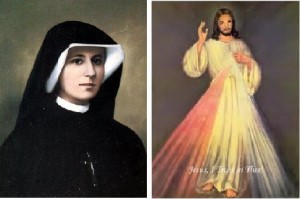With The Lord There Is Mercy and Fullness of Redemption (Psalm 129 (130)):
Posted by Fr. JonathanSep 1
The famous Psalm, the ‘De Profundis’ is recited when a person dies. It speaks about God’s mercy:
“With the Lord there is mercy and fullness of redemption”.
Mercy, or the loving kindness of God, has been a theme in God’s relationship with his people, in both the Old and New Testaments. In the ‘Magnificat’, we read: “His mercy is from age to age, on those who fear him”, and in the ‘Benedictus’, we read: “You little child, (i.e. John the Baptist) shall go ahead of the Lord to prepare his ways before him, to make known to his people their salvation through the forgiveness of all their sins, the loving-kindness of the heart of our God who visits us like the dawn from on high”. This conjunction of ‘mercy’ – or ‘loving kindness’ – and God, go right back to the origins of our Christian Faith.
When we first began hearing, in Lancashire of the 1990’s, about ‘Divine Mercy Sunday’ – the Sunday after Easter – as a special day in the Church, I heard priests, and others, questioning the idea. We were in Lent, soon approaching Holy Week. Then, as now, during Holy Week, we would have been celebrating the whole story surrounding the merciful Love of God, which is the whole point of the mystery of Jesus’ excruciating Passion experience, followed by the victory over sin and death, that comes with his glorious Resurrection. Why was it necessary, then, to have another special feast day for Divine Mercy? Some of the opinions advanced in those days – some twenty years ago now – seemed to suggest that the Divine Mercy devotions were rather backward looking, conservative, very pious, and rather for the old-fashioned! Also, was it not rather strange to suggest that on Good Friday, of all days, a novena should start to promote ‘Low Sunday’ as the ‘Feast of Divine Mercy’ when, for centuries, Good Friday had been THE feast of God’s mercy!
On the other hand, in the 20th Century, God has brought mercy to the forefront in a new way, by the gift given to Saint Maria Faustina Kowalska, a Polish nun, highlighting, precisely, this aspect of God. With the guidance of Almighty God, and the help of her confessor, Fr. Michal Sopocko, she was the one who promoted the Sunday after Easter, as the ‘Divine Mercy Sunday’.
 |
Saint Maria Faustina Kowalska & Picture of Jesus of Divine Mercy
On the occasion of my Ruby Jubilee of Priesthood, I asked Fr. Egidio Mazutti, an Italian priest-friend to preach, and he spoke about ‘The Divine Mercy’; he also presented me with a copy of the Diary of Saint Faustina, and this has brought this saint ‘alive’ for me, as I grow in awareness of the greatness of her spirit. She is a comparatively ‘recent’ saint, and the story of ‘her soul’ is fascinating. She became a nun, after various vicissitudes, in the Sisters of Our Lady of Mercy, on 30 April 1926. She died at the young age of 33, in 1938. To be honest, over the years, and even before reading her diaries, my attitude to the Divine Mercy celebrations on ‘Low Sunday’, had already undergone radical change, and in a very positive way.
As to these changes wrought in my own make-up, for one thing, I have seen the piety and goodness and of those who attend the ‘Divine Mercy’ devotions, in our Church, each ‘Low Sunday’; for another, I have witnessed the remarkable conversions of people, back to God and the Church, that have been the result of these devotions, within our own St. Mary’s Parish. But most of all, my reflections on my own life, and on the horrors of the Twentieth Century, has affected me, greatly. From time to time, I have been in need of mercy from God – and others; it has always been more helpful, to me, to receive sympathy and understanding, rather than judgement and condemnation. It is not the case that there has been no judgement, when sympathetically received; rather, the judgement is easier to receive – and to deliver, I suspect. Then again, the situation, in today’s world, leads me to believe, that one gift the world ‘desperately’ needs, in a new way, is precisely that of believing in God’s merciful Love – ‘desperately’, because of the absolutely horrific times in which we live – the gut-wrenching, life-pictures we modern people see – the ‘blackest’ evils we experience – and the confusions of mind and heart, that are now so widespread.
The horrors of the 20th Century cry out for merciful forgiveness, first of all from God, for so many evil atrocities, and secondly, for mercy between human beings.
 |
The Atom Bomb on Japan and Its Devastation
Picture the horrors of two world wars and the wholesale slaughter of civilians, by mass bombings, by atomic bombs, in concentration camps – particularly the six-million Jews at the hands of the Nazis: picture, if you can, the Russian genocide, by Russians, under Stalin, nothing other than the mass-murder of their own peoples – and others; that slaughter was surpassed, probably, if that was possible, by Mao Tse Tung and his supporters in China; picture the scene of the mass murders by Pol Pot, and similar scenes later in Ruanda; then, take on board the wholesale slaughter of the unborn, in many countries, which, to legal shame, began in Britain in 1967; elsewhere on this ‘widescreen’, there is that lack of moral uprightness in the ‘capitalist’ societies of the developed world, resulting in injustice, deprivation, disease, hunger and starvation; and the picture would not be complete with scenes of oppression of Palestinians, by Israelis in the Holy Land, the rise of terrorism, and suicide bombings. It is impossible to describe all of them! The list of horrors goes on and on!
 |
An Aborted Foetus at Eight Weeks Old
As to the confusions of minds and hearts, I think of the challenges loyal, Catholic grand-parents, face when few, if any, of their children or grand-children, regularly worship God, on Sundays, any more. I worry about the rise of militant secular values that influence so many towards indifference to the ‘real’ values of the Gospel. I fear for a world, in which we are living a ‘cultural dark night’, of such darkness, that it seems God is irrelevant, and in support of this proposition, it was said by an Estonian on the radio only this week, that ‘she had no time for a dead guy up in the sky, nor did most of her fellow countrymen and women’. (Estonia is allegedly one of the least religious countries of the world). Much, much more could be said on this topic of rising confusion – confusion, perhaps also delusion! Pope John Paul II spoke the following words in his homily, on Divine Mercy Sunday, 22 April 2001: “The message [St. Faustina] brought is the appropriate and incisive answer that God wanted to offer to the questions and expectations of human beings in our time, marked by terrible tragedies.”
“The loving-kindness of the heart of our God who visits us like the dawn from on high”, has shown itself in all these bleak situations, and experiences, in many different ways, and now, briefly, I return to Sister Faustina. She used to talk to Jesus, personally, and He to her. She not only suffered physically with her TB, but often she also felt spiritually forsaken by God. However, her faith in God’s love and mercy was what maintained her on the journey of life that God wanted for her. Among many other things, Jesus told her:
-
In the Old Covenant I sent prophets wielding thunderbolts to my people. Today I am sending you with my mercy to the people of the whole world. I do not want to punish aching mankind, but I desire to heal it, pressing it to my Merciful Heart. (1588 in her diary)
-
It’s a sign for the end times; after it will come the day of justice. While there is still time, let them have recourse to the fount of my mercy; let them profit from the Blood and Water which gushed forth for them. (848 in her diary). (Let) the greatest sinners put their trust in my mercy. They have a right before others to trust in the abyss of my mercy. My daughter, write about my mercy towards tormented souls. Souls that make an appeal to my mercy delight me. To such souls I grant even more graces than they ask. I cannot punish even the greatest sinner if he makes an appeal to my compassion, but on the contrary, I justify him in my unfathomable and inscrutable mercy. Before I come as a just Judge, I first open wide the doors of my mercy. He who refuses to pass through the doors of my mercy must pass through the doors of my justice. (1146 in her diary).
Sister Faustina proclaims the most wonderful insight that one small drop of the blood of Jesus, would be enough to wipe out all the sins of the world, and that blood has already been shed. So, despite the worst evils of the world, despite the worst sins of all humankind, God’s mercy is, in comparison, like the width of the ocean, to a drop in a rain storm. It is always available for us, as long as we turn to him, and seek his Divine Mercy.
If you, O Lord, should mark our guilt, Lord, who would survive?
But with you is found forgiveness, for this we revere you…
Because with the Lord there is mercy and fullness of redemption…
(Psalm 129 (130) The De Profundis)
 |
The Return of the Prodigal Son
In e-mailing the blog, ‘Word Press’ tends to distort the original formatting of the document. Readers may wish to visit the website www.stmarysblog.co.uk to read it in its original format.

No comments